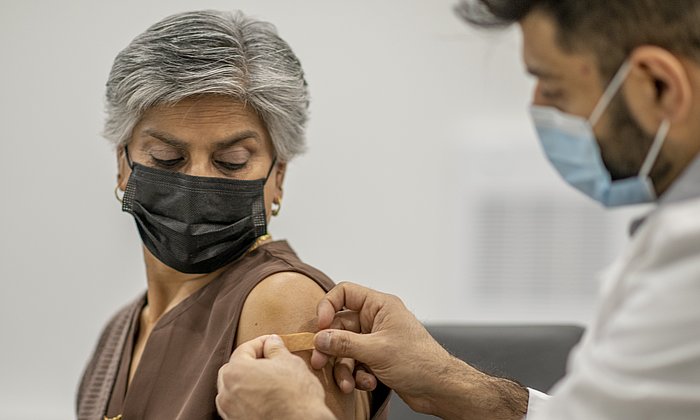Covid-19: contextualizing vaccination side effects can reduce concerns
Higher vaccination willingness through simple risk comparisons

Side-effects are a common fear around Covid-19 vaccination. Therefore, a team of researchers at the Technical University of Munich (TUM) and Heidelberg University Hospital (UKHD) conducted a randomized controlled trial to investigate if willingness to get vaccinated can be improved by putting risks into broader context.
Between July and October 2021, approximately 9000 vaccinated and unvaccinated adults in the USA and the UK were shown a description of a hypothetical Covid-19 vaccine with a risk of side effects comparable to that of existing vaccines. This online information was framed either with a simple label stating that the risk is very low, by adding a comparison with the risk of dying in a motor vehicle, or with a comparison to Covid-19 mortality. Parts of the sample received a combination or no additional information. The participants were then asked whether they would take the vaccine and how safe they thought the vaccine was.
No effects of comparisons with Covid-19 death rates
They research team found that adding the “very low risk” label increased people’s intentions to take the vaccine by 3 percentage points as compared to the control group. Similarly, adding the comparison to motor vehicle death rates increased the willingness by 2.4 percentage points. These framing tools had even stronger effect when used together: the vaccine intentions were 6.1 percentage points higher. The effects did not differ by country, age or gender.
Comparing vaccine side-effect rates with Covid-19 death rates did not appear to influence vaccine intentions. The researchers had not expected this as Covid-19 death rates were substantially higher than motor vehicle death rates (170 per 100,000 versus 12 per 100,000 in the US) and as this cause of death is directly associated with the purpose of Covid-19 vaccination strategies.
“Even simple tools can increase trust”
“The study shows that even simple tools can increase trust in the safety of vaccines,” says lead author Nikkil Sudharsanan, a professor of Behavioral Science for Disease Prevention and Health Care at TUM. “The way risks are framed and presented to people can affect their perceptions of the severity of risk. Concern about side effects was heightened by widespread media coverage that did not put the very low risk in context with other risks. Comparing the risk of side effects with everyday risks could be a key component of efforts to improve vaccine use.”
“We believe our results can inform communication efforts aimed at increasing vaccination, especially booster vaccinations,” concludes co-author Alain Vandormael, Senior Data Scientist at the Heidelberg Institute of Global Health at UKHD. “Our results are focused on vaccine intentions and not vaccination rates, so the next step is to test whether these framing efforts can increase shots in arms before translating our findings into policy action.”
Nikkil Sudharsanan, Caterina Favaretti, Violetta Hachaturyan, Till Bärnighausen, Alain Vandormael (2022). Effects of side-effect risk framing strategies on COVID-19 vaccine intentions: a randomized controlled trial. eLife 11:e78765.
https://doi.org/10.7554/eLife.78765
Technical University of Munich
- Klaus Becker
Contacts to this article:
Prof. Nikkil Sudharsanan, PhD, MPH
Technical University of Munich (TUM)
Professorship of Behavioral Science for Disease Prevention and Health Care
Phone: + 49 89 289 24990
nikkil.sudharsanan@tum.de
www.sg.tum.de/behavscihealth


